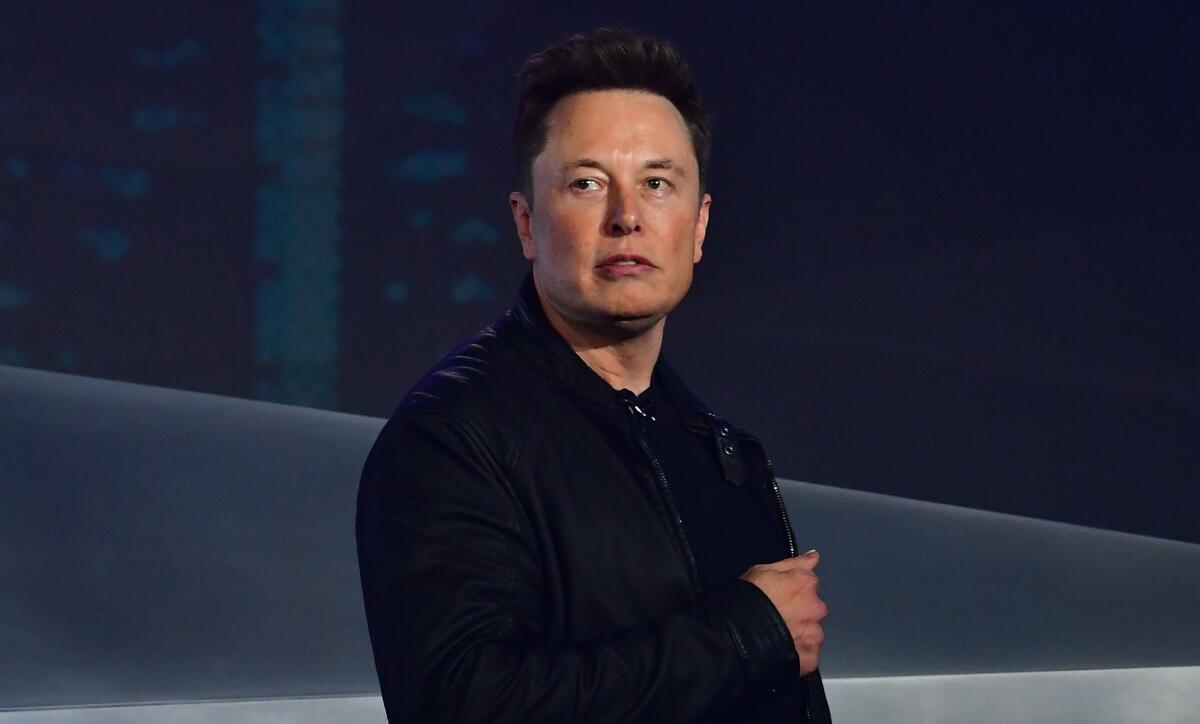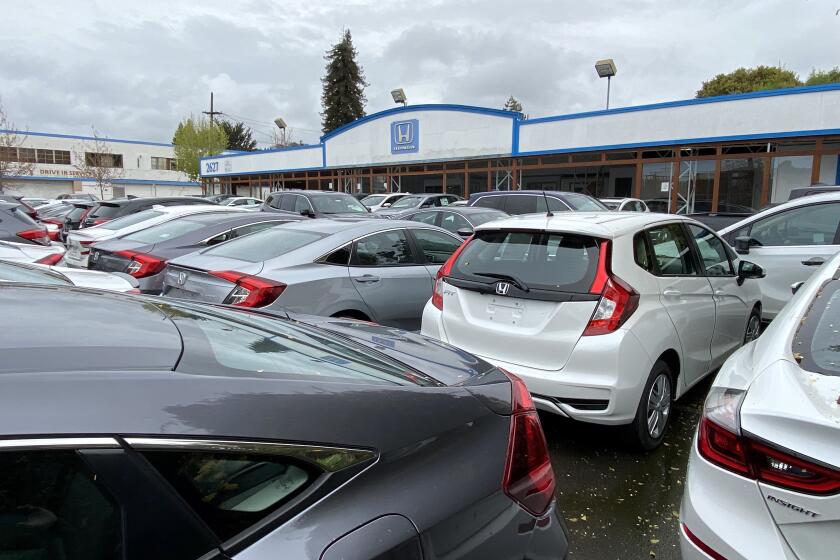Elon Musk’s surprise reopening of Tesla pits business against government

- Share via
The movement to jailbreak the economy out of COVID-19 quarantine has a new champion, for better or worse: Tesla Motors Chief Executive Elon Musk.
The mercurial tech billionaire escalated conflict with local officials on Monday when he declared — in a tweet, of course — that the company’s Fremont, Calif., factory had resumed manufacturing operations in the face of standing orders to remain closed.
“Tesla is restarting production today against Alameda County rules,” Musk tweeted. “I will be on the line with everyone else.”
The defiant pose — “If anyone is arrested, I ask that it only be me,” he added — earned him instant social media comparisons to civil rights icon Rosa Parks. Not all were ironic.
Musk’s move is the most striking instance to date of a powerful company pushing back on government-mandated COVID-19 stay-at-home orders, making him a de facto ally of the protesters who have rallied at sites from Huntington Beach to the Michigan statehouse to demand their end. Shutdowns have caused financial strain for many companies, and in a blog post on Saturday, Tesla said the county’s position left it no choice but to take legal action to make sure Tesla employees can go back to work.
But in starting production without permission, the company has barreled past the legal process and skirted negotiations with the county. The parking lot at the massive plant in Fremont, which employs 10,000 workers, was nearly full Monday.
Musk suggested the public health order he ignored was itself unlawful, coming from “an unelected county official” who “illegally overrode” the reopening timeline laid down by Gov. Gavin Newsom.
Legal and regulatory experts disputed that interpretation but said Musk’s establishment of facts on the ground puts pressure on the county, and could inspire other businesses to challenge restrictions meant to protect workers and limit the spread of the virus.
“The legal claims being raised by Musk, they do not have merit,” said Jodi Short, a law professor studying government regulation of business at UC Hastings. “That said, this is creating an enormous political firestorm. That is clearly the strategy here.”
Musk “only seems to believe in law and order if he writes the law and gives the order,” said Matt Stoller, a researcher at the American Economic Liberties Project and author of “Goliath: The Hundred-Year War Between Monopoly Power and Democracy.”
Businesses that lack Musk’s vast personal following and Tesla’s status as a large employer face a different set of risks if they choose to reopen against legal mandates. “It would be a lot easier for a sheriff to come into a local bar and just shut that business down than it would be for a sheriff to march into the shop floor of Tesla,” Short said.
Musk has resisted public health mandates throughout the coronavirus crisis.
After six Bay Area counties issued stay-at-home orders in mid-March, Musk kept the plant open nearly a week before Fremont police stepped in.
He came out against the orders publicly during a conference call to discuss Tesla’s first-quarter earnings on April 29. He called the restrictions “fascist” and urged governments to stop taking people’s freedom. He threatened in a now-deleted tweet to move Tesla’s headquarters from California to Texas or Nevada.
On Friday, the county issued a statement explicitly telling the company it “must not reopen” the plant.
The next day, Tesla filed a lawsuit against local authorities, calling the continued restrictions a “power-grab” by the county since Newsom had said on Thursday that manufacturers in the state would be permitted to reopen. The governor has said repeatedly that counties can impose restrictions that are more stringent than state orders.

The county said it has been working with Tesla to develop a safety plan allowing the Fremont plant to reopen. Alameda county spokesperson Neetu Balram said in a statement the county has collaborated “in good faith” with the company to create a plan that ensures safety for employees through screening procedures and by establishing processes for collecting feedback from front-line staff.
Balram said the county expected Tesla to submit a site-specific safety plan on Monday following state guidance on manufacturing businesses. But Balram said late Monday afternoon the county had not yet received a plan from Tesla.
State law allows a fine of as much as $1,000 per day or up to 90 days in jail for operating in violation of health orders.
Over the weekend, Tesla published a 38-page “return to work” playbook outlining safety procedures for its workers amid the pandemic. They include increased cleaning, enforcement of social distancing, providing face coverings and gloves where needed, installing barriers between workers when necessary and worker temperature checks at “some locations.”
“Our employees are excited to get back to work, and we’re doing so with their health and safety in mind,” Tesla’s Saturday statement said.
Showrooms are closed, but many car dealers sell online, with delivery to your door.
Musk previously wrote that whether the company keeps any manufacturing in Fremont depends on how Tesla is treated in the future.
It would be costly and difficult to quickly shift production from Fremont to Texas or Nevada. The Fremont facility, formerly run jointly by General Motors and Toyota, is Tesla’s only U.S. vehicle assembly plant, and the company would lose crucial production if it shut down the plant to move equipment.
But Musk plans another U.S. factory to increase output, possibly in Texas, and could move production once that plant is up and running.
At a news conference, Newsom sidestepped a question about Musk’s threat to move Tesla out of California, saying he was a supporter of innovative companies. He did say, however, that Tesla has benefited greatly by being in the state.
“I have more confidence moving forward in our ability to support a company that this state has substantively supported for now many, many years,” Newsom said. “And in return, we have been beneficiaries of their incredible growth, ingenuity and innovative spirit. We look forward to many, many decades of that relationship and I know many of us are frustrated by where we are in this pandemic.”
The lack of production in Fremont has cut off Tesla’s revenue and is a big financial strain. On a conference call last month, Musk said the Fremont facility produces the majority of its vehicles. He called the closure of the Fremont plant a “serious risk.”
Tesla’s moves come as competing automakers are starting to reopen factories in the U.S. Toyota also planned to restart production Monday, while General Motors, Ford and Fiat Chrysler all plan to restart their plants gradually on May 18. Tesla is the only major automaker with a factory in California.
Times staff writer Phil Willon and the Associated Press contributed to this report.
More to Read
Inside the business of entertainment
The Wide Shot brings you news, analysis and insights on everything from streaming wars to production — and what it all means for the future.
You may occasionally receive promotional content from the Los Angeles Times.











